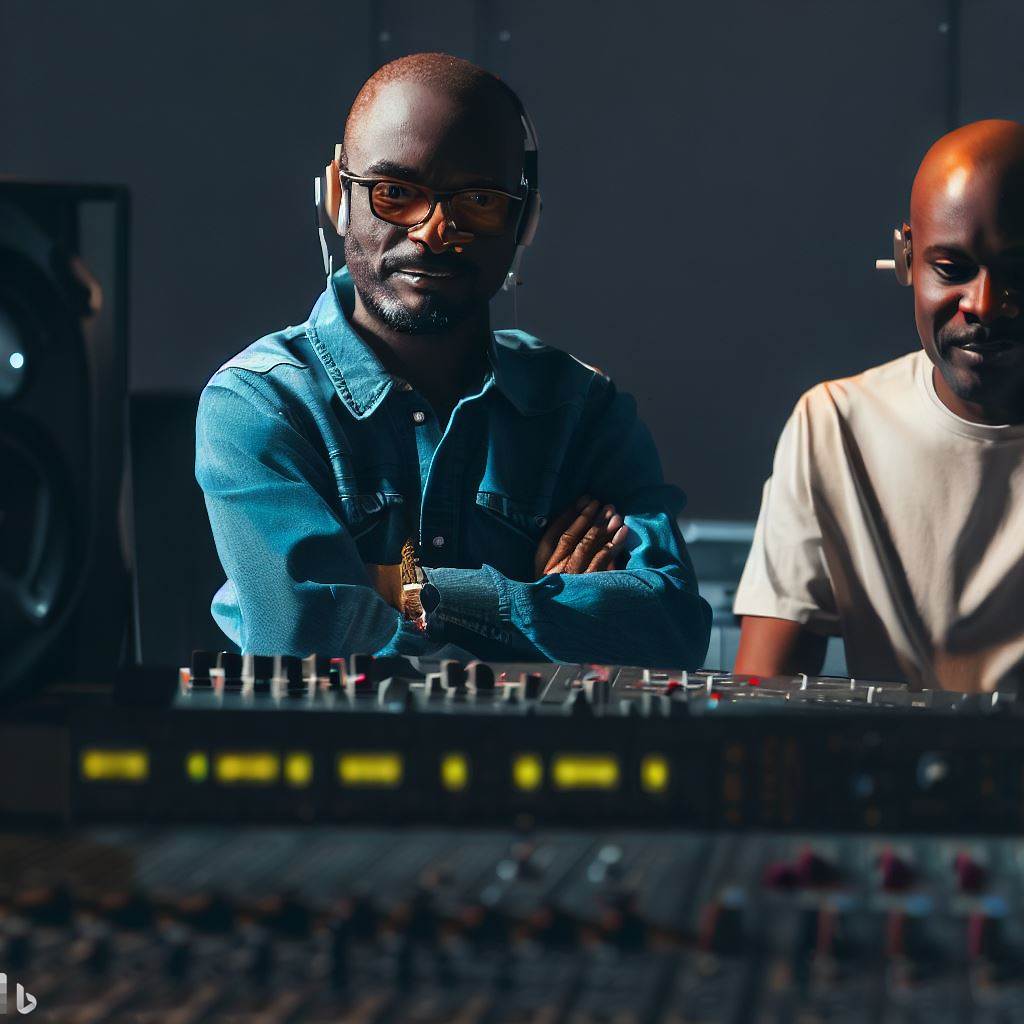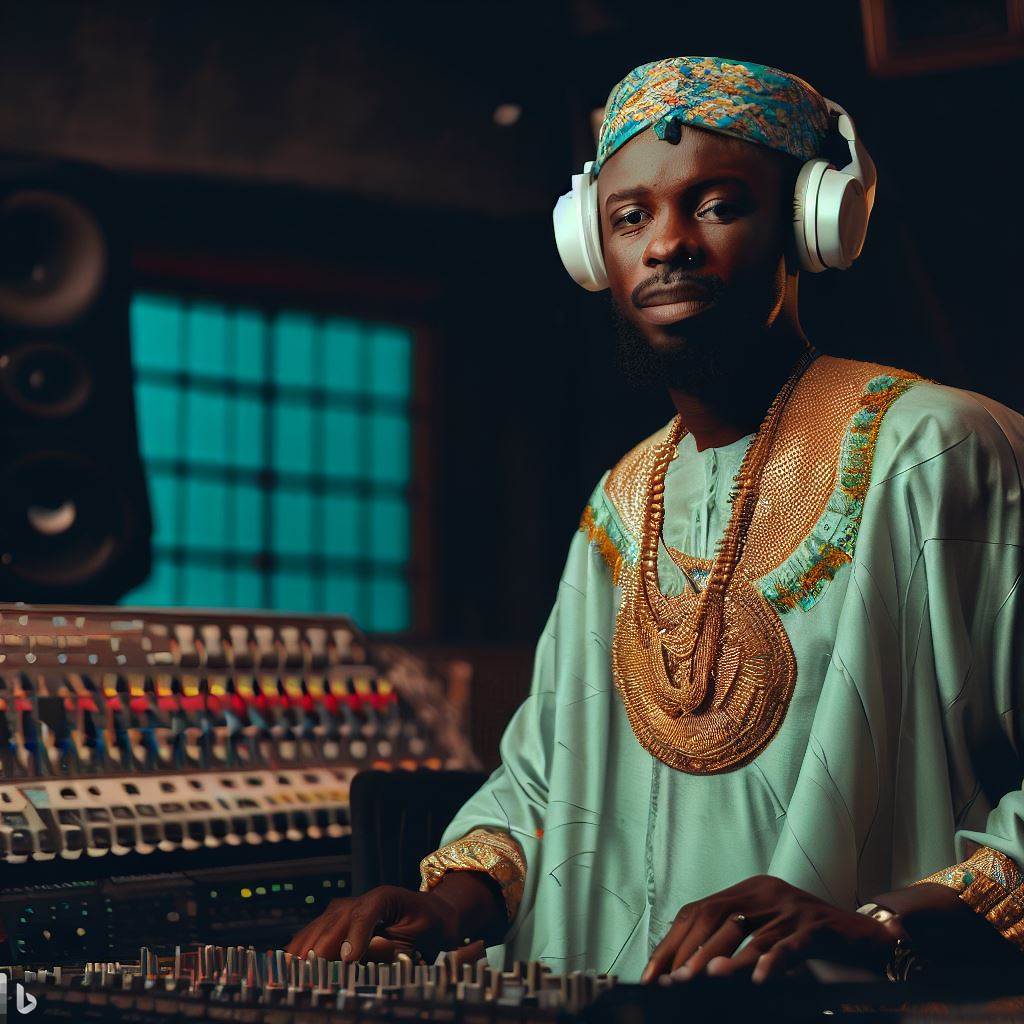Introduction
In this blog post, we will delve into the intricacies of the Nigerian music producer workspace, uncovering its significance and impact.
The Nigerian music industry is a powerful force that has gained global recognition and influence.
One of the key factors behind its success is the important role played by music producers.
By exploring this topic, we aim to provide readers with a comprehensive understanding of the behind-the-scenes work that goes into the creation of Nigerian music.
Get ready to dive into the world of music production in Nigeria!
Overview of the Nigerian Music Producer
Definition of the Role and Responsibilities of a Music Producer
- A music producer is responsible for overseeing the creation and recording of music.
- They work closely with artists, assisting them in developing their sound and vision.
- Producers also handle technical aspects, such as selecting and arranging instruments and recording techniques.
- Additionally, they oversee the mixing and mastering process to ensure the highest quality sound.
- Producers often act as creative collaborators, helping artists bring their ideas to life.
Evolution of Music Production in Nigeria
- Nigeria has witnessed significant growth in music production over the years.
- Initially, traditional instruments were used, followed by the introduction of electric instruments.
- The advent of technology brought about digital music production, revolutionizing the industry.
- Producers started utilizing synthesizers, drum machines, and software to create unique sounds.
- Today, advancements like virtual instruments and digital audio workstations have expanded creative possibilities.
Contributions of Nigerian Music Producers to the Industry’s Growth
- Nigerian music producers have played a crucial role in shaping the industry.
- They have helped create distinct sounds for various genres, including Afrobeats, Afro-pop, and Highlife.
- Producers like Don Jazzy, Pheelz, and Sarz have contributed to the global recognition of Nigerian music.
- They have also fostered collaborations between Nigerian and international artists, expanding the industry’s reach.
- Furthermore, producers have cultivated a culture of innovation, pushing boundaries and experimenting with new styles.
By embracing their role as collaborators and innovators, Nigerian music producers have propelled the industry forward.
Through their technical expertise and creative vision, they have elevated Nigerian music on a global scale. As the industry continues to evolve, these producers will undoubtedly continue to shape its future.
Read: Nigerian Music Production: Understanding the Legal Aspects
The Physical Workspace
Typical setup of a Nigerian music producer’s workspace
In a Nigerian music producer’s workspace, the typical setup involves several key elements:
- A computer or laptop with music production software
- A digital audio workstation (DAW) for recording, editing, and mixing music
- A MIDI controller or keyboard for playing and recording musical instruments
- A pair of studio monitors or headphones for accurate audio monitoring
- An audio interface for connecting external audio devices to the computer
- A microphone for recording vocals and other acoustic instruments
- A collection of musical instruments such as guitars, drums, and synthesizers
- An ergonomic desk and chair for a comfortable and healthy working posture
- A soundproof room or acoustic treatment to minimize outside noise and optimize sound quality
- A cable management system to keep the workspace organized and free from clutter
The importance of a conducive environment for creativity and productivity
A conducive environment is crucial for both creativity and productivity in music production.
Having a dedicated space solely for music production allows producers to focus and concentrate on their work.
Minimal distractions and disruptions enable them to explore their creativity and bring out their best musical ideas.
A comfortable and well-designed workspace also contributes to better productivity and workflow.
Producers can work for extended periods without experiencing physical discomfort or fatigue.
Essential equipment and technology found in the workspace
The essential equipment and technology found in a Nigerian music producer’s workspace are instrumental in their creative process.
A computer or laptop acts as the central processing unit, running the necessary software and handling multiple tracks and effects.
The digital audio workstation (DAW) provides a platform for recording, arranging, and manipulating musical elements.
A MIDI controller or keyboard allows producers to play and record virtual instruments and control various parameters.
Studio monitors or headphones ensure accurate monitoring of the audio, allowing producers to make precise mix and mastering decisions.
An audio interface serves as the bridge between the computer and external audio devices, enabling high-quality audio recording and playback.
A microphone is essential for capturing vocals, live instruments, and sound effects, adding depth and personality to the music.
Musical instruments like guitars, drums, and synthesizers add live performance elements and unique textures to the production.
An ergonomic desk and chair enable producers to have a comfortable and healthy posture while working long hours.
A soundproof room or proper acoustic treatment helps create a controlled listening environment, reducing unwanted reflections and external noise.
A cable management system keeps the workspace organized, preventing tangled cables and potential technical issues.
Read: The Role of Technology in Nigeria’s Music Production Scene
Collaboration and Networking
Collaboration is of immense significance among Nigerian music producers as it promotes creativity, growth, and innovation.
Networking within the industry provides music producers with better opportunities to showcase their talent and expand their professional connections.
Mentorship and knowledge sharing play a vital role in the music producer community, fostering skill development and industry expertise.
Significance of Collaboration among Nigerian Music Producers
- Collaboration encourages the exchange of ideas, as producers share their diverse skills and experiences.
- Through collaboration, producers combine their unique styles to create fresh, captivating sounds.
- Collaborative projects enable music producers to learn from each other and enhance their technical abilities.
- Working collectively allows producers to tap into different networks and widen their reach in the industry.
- Collaboration provides producers with a platform to experiment with diverse genres and broaden their artistic horizons.
Importance of Networking within the Music Industry
- Networking allows music producers to establish connections with fellow professionals, artists, and industry experts.
- Building a strong network increases the chances of collaborations, referrals, and exposure to new opportunities.
- Attending industry events, conferences, and workshops enhances networking opportunities for music producers.
- Networking enables producers to stay updated with the latest trends and advancements in the music industry.
- Having a wide network helps producers gain insights and advice from experienced individuals, fostering career growth.
Impact of Mentorship and Knowledge Sharing
- Mentorship provides aspiring music producers with guidance, industry knowledge, and constructive feedback.
- Experienced music producers mentoring novices helps to bridge the gap between theory and practical application.
- Knowledge sharing among music producers cultivates a supportive community that promotes continuous learning and growth.
- Mentorship programs serve as platforms for talented producers to access opportunities and public recognition.
- The shared knowledge and experiences contribute to the overall elevation of the music producer community.
In fact, collaboration, networking, mentorship, and knowledge sharing are paramount in the workspace of Nigerian music producers.
By collaborating, producers can harness their collective skills to create groundbreaking music. Networking opens doors to opportunities, expands professional connections, and fosters growth within the industry.
Mentorship and knowledge sharing contribute to skill development, industry expertise, and the overall progress of music producers.
Embracing these aspects not only benefits individual producers but also enhances the Nigerian music industry as a whole.
Read: The Impact of Nigerian Music Producers on Global Sounds

Working Process and Creative Techniques
Music production is a complex and intricate process that involves several steps.
Nigerian music producers have developed unique creative techniques that contribute to the success of their productions.
Here, we will explore the step-by-step process of music production and discuss these innovative approaches employed by prominent Nigerian producers.
Step-by-Step Process Involved in Music Production
- Pre-production: The initial phase where producers brainstorm ideas, create demos, and select the best concepts.
- Recording: Artists lay down their vocals or instrumental tracks in a professional recording studio.
- Arrangement: Producers organize the recorded elements, considering the structure and flow of the song.
- Editing: Fine-tuning recordings, removing imperfections, and ensuring tight sync between different tracks.
- Mixing: Balancing the levels, panning, and equalizing each instrument and vocal to create a cohesive sound.
- Mastering: Adding final touches to the mixed track, enhancing overall tonal balance, and ensuring compatibility across various devices.
Unique Creative Techniques Employed by Nigerian Music Producers
Nigerian music producers are renowned for their innovative approaches that help shape the distinct sound of Nigerian music.
These techniques include:
- Sampling: Extracting portions of existing recordings and incorporating them into new tracks to add a nostalgic or unique vibe.
- Fusion of genres: Blending traditional Nigerian music styles with contemporary genres like Afrobeat, highlife, and hip-hop.
- Percussion arrangement: Creating intricate and groovy percussion patterns using traditional Nigerian instruments.
- Vocal manipulation: Experimenting with vocal effects and modulations to create interesting textures and harmonies.
- Drum programming: Crafting rhythmic patterns and beats using virtual drum machines and samplers.
Success Stories of Innovative Approaches Used by Prominent Producers
Several Nigerian music producers have achieved remarkable success through their innovative techniques.
Here are some notable examples:
- Don Jazzy: He introduced a unique production style by infusing Western sounds with Nigerian elements, revolutionizing Nigerian music.
- Sarz: Known for his versatile beats and distinctive use of percussion, Sarz has produced chart-topping hits for numerous Nigerian artists.
- Pheelz: He developed a signature sound by incorporating Afrobeat influences with contemporary urban music, gaining international recognition.
- Masterkraft: His exceptional sampling skills and ability to blend various genres have made him one of Nigeria’s most sought-after producers.
- Kel-P: With his futuristic and eccentric production techniques, Kel-P has contributed to the global recognition of Nigerian Afrobeat music.
In a nutshell, music production involves a comprehensive step-by-step process that includes pre-production, recording, arrangement, editing, mixing, and mastering.
Nigerian music producers bring their unique creative techniques to the table, such as sampling, genre fusion, percussion arrangement, vocal manipulation, and drum programming.
Through these innovations, prominent producers like Don Jazzy, Sarz, Pheelz, Masterkraft, and Kel-P have achieved remarkable success in the Nigerian music industry.
Read: Nigeria’s Influence on Global Costume Design Trends
Challenges and Success Stories
Challenges Faced by Nigerian Music Producers in Their Workspace
- Limited Resources: Producers often struggle with access to quality equipment and recording studios.
- Lack of Recognition: Despite their pivotal role, producers often go unnoticed and underappreciated.
- Financial Constraints: Many producers face difficulty in funding their projects and sustaining their careers.
- Unreliable Power Supply: Frequent power outages disrupt work progress and hinder productivity.
- Inadequate Technical Skills: Some producers lack proper training and knowledge in audio engineering and music production techniques.
- Copyright Infringements: Producers face challenges regarding the protection of their intellectual property rights.
Hurdles of Balancing Artistic Freedom and Commercial Viability
- Creative Control: Producers often face conflicting interests between their artistic vision and commercial demands.
- Pressure from Record Labels: Labels may prioritize commercial success over artistic integrity, causing friction with producers.
- Market Trends and Audience Preferences: Producers must navigate the constant evolution of music tastes and adapt accordingly.
- Limited Experimentation: Commercial viability may restrict producers from exploring unconventional or experimental sounds.
- Balancing Mainstream and Underground Appeal: Producers need to cater to commercial markets while staying true to their unique sound.
- Time Constraints: Meeting tight deadlines can limit the creative process and compromise artistic expression.
Inspiring Success Stories of Acclaimed Music Producers Overcoming Obstacles
- Don Jazzy: Despite starting from humble beginnings, he built a successful production empire, creating hits for numerous artists.
- Sarz: Overcame financial challenges and emerged as one of Nigeria’s most sought-after producers, working with top artists.
- Cobhams Asuquo: Despite being visually impaired, he has produced chart-topping songs and won multiple awards.
- Masterkraft: Started with limited resources but persevered to become a renowned producer in the Nigerian music industry.
- Pheelz: Overcame initial skepticism and went on to produce hits for prominent artists, solidifying his position in the industry.
- Young Jonn: Risen from poverty, he has become a prominent producer, known for his unique sound and collaborations with A-list artists.
These success stories serve as inspiration to aspiring producers, highlighting the possibilities of overcoming challenges and achieving recognition and success in the Nigerian music industry.
Despite the obstacles, resilience and determination can lead to artistic growth and commercial viability.
Conclusion
We have explored the in-depth analysis of the Nigerian music producer’s workspace.
Throughout the blog post, we have discussed various key points that shed light on the importance of this workspace in shaping the music industry in Nigeria.
The Nigerian music producer’s workspace is not just a physical location; it is a creative hub where magic happens.
It is where producers bring together their ideas, equipment, and expertise to create memorable and impactful music.
Without this workspace, many of the hit songs and albums that we enjoy today would not exist. We must appreciate the behind-the-scenes work and dedication of music producers.
They work tirelessly to fine-tune each element of a song, from the instrumental arrangement to the mixing and mastering process.
Their attention to detail and commitment to quality ensure that we receive exceptional music experiences.
The workspace of a Nigerian music producer serves as a catalyst for the growth and development of the music industry.
It provides an environment that nurtures creativity, allowing producers to experiment with different sounds and genres.
This experimentation leads to the discovery of innovative music styles and the birth of new trends.
Furthermore, music producers play a vital role in bridging the gap between artists and the audience. They help artists bring their visions to life and make their music more accessible and relatable.
The workspace becomes a collaborative space where producers and artists work together to transform ideas into reality.
The Nigerian music producer’s workspace is a powerhouse of creativity and innovation. We should acknowledge and appreciate the hard work and talent that goes into producing music.
Next time you listen to your favorite Nigerian song, take a moment to think about the behind-the-scenes efforts of the music producers who made it possible.




